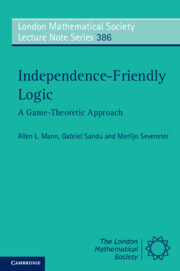2 - Game theory
Published online by Cambridge University Press: 01 June 2011
Summary
According to A Course in Game Theory, “a game is a description of strategic interaction that includes the constraints on the actions that the players can take and the players' interests, but does not specify the actions that the players do take” [45, p. 2]. Classical game theory makes a distinction between strategic and extensive games. In a strategic game each player moves only once, and all the players move simultaneously. Strategic games model situations in which each player must decide his or her course of action once and for all, without being informed of the decisions of the other players. In an extensive game, the players take turns making their moves one after the other. Hence a player may consider what has already happened during the course of the game when deciding how to move.
We will use both strategic and extensive games in this book, but we consider extensive games first because how to determine whether a first-order sentence is true or false in a given structure can be nicely modeled by an extensive game. It is not necessary to finish the present chapter before proceeding. After reading the section on extensive games, you may skip ahead to Chapter 3. The material on strategic games will not be needed until Chapter 7.
Extensive games
In an extensive game, the players may or may not be fully aware of the moves made by themselves or their opponents leading up to the current position.
- Type
- Chapter
- Information
- Independence-Friendly LogicA Game-Theoretic Approach, pp. 9 - 27Publisher: Cambridge University PressPrint publication year: 2011



